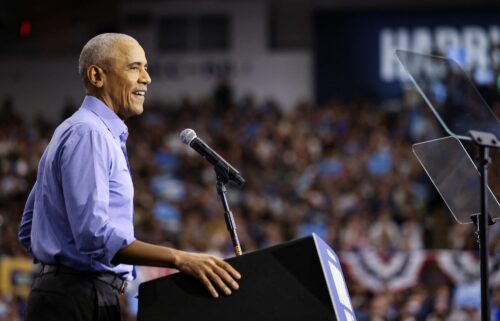Justice Department watchdog says FBI could have ended Carter Page surveillance months earlier
The Justice Department’s inspector general said Wednesday that the FBI should have considered whether to end surveillance of Trump campaign aide Carter Page far earlier than it did, after learning that allegations of collusion against him might not be credible.
The inspector general, Michael Horowitz, told the Senate Homeland Security Committee that FBI investigators should have thought about scaling back the wiretaps and surveillance of Page in January 2017. Instead, the government surveillance continued until September 2017.
“If you’re getting information that isn’t advancing, and in fact potentially undercutting, or simply undercutting your primary theme or theory as was happening here… you’d look at the Carter Page file and say, should I keep going on this?” Horowitz told the Senate committee, explaining that the FBI wasn’t finding much to corroborate allegations that Page was working with Russia.
But Horowitz declined to say that the FBI should have shut down the entire Russia investigation, after facing questions from Sen. Ron Johnson, the Republican chairman of the committee.
The Page investigation was only one of four probes that the FBI launched in July 2016 into specific Trump campaign associates, after receiving a tip that the campaign was potentially working with the Kremlin to win the election. The three other targets have all since been convicted of crimes, though none of them were formally accused of conspiring with Russia.
Horowitz was on Capitol Hill for the second time in two weeks, testifying about his blockbuster report about the early stages of the Russia investigation and wiretaps against Page.
The sweeping report concluded that the FBI was justified when it opened investigations into accusations of collusion between Trump’s campaign and the Russian government. The report also said decisions by senior FBI officials weren’t motivated by political bias against Trump. Horowitz repeated these primary conclusions on Wednesday.
Horowitz also uncovered significant problems and mistakes with the court-approved surveillance of Page, which included wiretap and electronic surveillance. This was all conducted under the Foreign Intelligence Surveillance Act, or FISA, which is typically used for terrorists and spies.
In an extraordinary order publicly released on Tuesday, the FISA court slammed the FBI its handling of the Page warrants and ordered the agency to explain how it’s going to prevent these errors in the future. The court gave the FBI a January 10 deadline to respond. FBI Director Christopher Wray previously said he was implementing at least 40 corrective measures.
In his opening statement, Johnson immediately raised questions about the FBI’s motives for investigating the Trump campaign, and he leaned into a handful of conspiracy theories that have been embraced by President Donald Trump and right-wing news outlets.
Horowitz did not offer any testimony Wednesday to bolster these conspiracy theories, including claims that Trump campaign aides were framed by politically biased agents within the FBI. On Wednesday, Horowitz further undercut Trump’s shocking accusation in 2017 that his phones were wiretapped at Trump Tower. Horowitz said he found no proof to back that up.
The watchdog report debunked this and other conspiracies that Trump and his allies have peddled.
Even though Horowitz has long been respected as an independent and apolitical fact-finder, Trump and Attorney General William Barr have publicly rejected some of his key findings. Barr specifically cast doubt on the premise of the Russia probe and suggested that some FBI agents were acting in “bad faith.” And Trump still maintains that the entire investigation was a hoax.
‘We’re not concluding that someone’s biased simply because they supported one candidate or another’
The Justice Department’s investigators examined more than 1 million documents and interviewed more than 100 witnesses, and did not find evidence that anti-Trump bias motivated the key decisions to open the collusion-related allegations or to seek the FISAs for Page.
These findings undercut Trump’s conspiracy-tinged allegation that Democratic “deep state” partisans within the US government, perhaps acting at the behest of former President Barack Obama, opened the Russia investigation in 2016 to prevent Trump from winning the election.
Republicans hammered Horowitz on the bias issue and pointed to politically charged texts that were exchanged by a senior FBI official involved in the investigation, Peter Strzok. The Republican lawmakers raised the possibility that FBI officials misled Horowitz’s investigators.
Horowitz explained that his exhaustive reviews of the Russia investigation and the probe into Democratic nominee Hillary Clinton’s email server did not find that bias infected FBI actions.
“We found, in both reports, evidence of political views disassociated from action, and that’s very important,” Horowitz said. “I tried to emphasize this last year, as well as last week. We’re not concluding that someone’s biased simply because they supported one candidate or another.”
FBI officials can have political views, as long as those views don’t impact their work decisions. Federal employees must follow some restrictions, but they keep their First Amendment rights.
Some Republicans on the committee weren’t satisfied with Horowitz’s answers, which they saw as splitting hairs. Sen. Josh Hawley, a Missouri Republican, said, “either these people were really incompetent, or bad at their jobs, or they had a political agenda that they were pursuing.”
The problems with FISA were so widespread that Horowitz launched a new audit of the process. Lawmakers from both parties said they appreciated the review, and some libertarian-leaning senators voiced concerns that the FISA process may have been undermined forever.
Meanwhile, Democrats focused on the parts of the watchdog report that affirmed the legitimacy of the Russia investigation, and peppered Horowitz with questions about potential FISA reform.
“The most important fact that we should take away from this report and this hearing is that Russia, a foreign adversary, engaged in a sweeping and systematic effort to interfere in the 2016 presidential election and that the FBI was right in investigating those who may have been involved,” said Michigan Sen. Gary Peters, the top Democrat on the committee.

